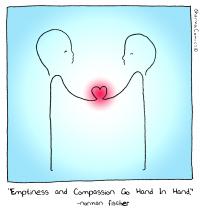Emptiness And Compassion Go Hand In Hand


The word “emptiness” is a fair translation of shunyata, but it has the drawback of sounding negative, even despairing. The Chinese, searching for a word that might translate shunyata, used the character for “sky.” All dharmas are empty like the sky -- blue, beautiful, expansive, and always ready to receive a bird, a wind, a cloud, the sun, the moon, or an airplane. It’s the emptiness of all limitation and boundary. It is open, released.
When I am bound inside my own skin and others are bound inside theirs, I have to defend and protect myself from them. And when I do place myself among them, I must do it carefully, which is hard work, because I am often hurt, opposed, and thwarted by others. But when there’s openness, no boundary between myself and others -- when it turns out that I literally am others and others literally are me -- then love and connection is easy and natural.
Emptiness and compassion go hand in hand. Compassion as transaction -- me over here, being compassionate to you over there -- is simply too clunky and difficult. If I am going to be responsible to receive your suffering and do something about it, and if I am going to make this kind of compassion the cornerstone of my religious life, I will soon be exhausted. But if I see the boundaryless-ness of me and you, and recognize that my suffering and your suffering are one suffering, and that that suffering is empty of any separation, weightiness, or ultimate tragedy, then I can do it. I can be boundlessly compassionate and loving, without limit. To be sure, living this teaching takes time and effort, and maybe we never entirely arrive at it. But it’s a joyful, heartfelt path worth treading.
In Mahayana Buddhism, compassion is often discussed in terms of absolute and relative compassion. Absolute compassion is compassion in the light of emptiness: all beings are empty; all beings are, by virtue of their empty nature, already liberated and pure. As the sutra says, suffering is empty, and relief from suffering is also empty.
But this would be one-sided and distorted. Relative compassion—human warmth and practical emotional support—completes the picture. Absolute compassion makes it possible for us to sustain, joyfully, the endless work of supporting and helping; relative compassion grounds our broad view of life’s empty nature in heart connection and engagement. Either view by itself would be impossible, but both together make for a wonderfully connected and sustainable life.
Excerpted from an article in Lion's Roar.
SEED QUESTIONS FOR REFLECTION: What does emptiness and compassion going hand in hand mean to you? Can you share a personal story of a time you felt the interplay between human warmth and emptiness? What helps you stay engaged while being rooted in emptiness?
Add Your Reflection
12 Past Reflections

On Jan 18, 2019 yahoo support number wrote :
Post Your Reply

On Jan 18, 2019 mcafee help number wrote :
Post Your Reply

On Jan 18, 2019 bellsouth support number wrote :
Post Your Reply

On Jan 18, 2019 roadrunner help number wrote :
Post Your Reply


On Sep 26, 2017 Dr Naznin wrote :
Could the word emptiness be replaced with expansiveness??
it is a more wholesome word with the same characteristics explained here.
more full than empty...
Post Your Reply

On Sep 12, 2017 Maryanne wrote :
What a healing integration of the two aspects of compassion, absolute and relative. I have often felt torn between, and thus lacking. This is a gift for meditation.
Post Your Reply

On Sep 11, 2017 Rashmi Sinha wrote :
Emptiness and compassion do go hand in hand for me... any presence of emotion, be it anger or joy brings in elevated sense of response whereas when there is shunyata there is uniform sense of compassion towards all.
Post Your Reply

On Sep 11, 2017 David Doane wrote :
Emptiness of preconceived judgments and agendas fosters feeling compassion and human warmth. Being rooted in emptiness helps me stay truly engaged with the other rather than with my thinking or goals regarding the other.
Post Your Reply

On Sep 11, 2017 Kristin Pedemonti wrote :
Post Your Reply

On Sep 9, 2017 Jagdish P Dave wrote :
Post Your Reply

On Sep 8, 2017 Rajesh wrote :
Very nice articulation of what compassion might mean in our daily lives. From my reading of the article, it seems to me that seeing the boundryless-ness of me and you is the pre-condition for us to be able to practice relative compassion. Since relative compassion goes hand in hand with emptiness. The difficulty for me then is in treading the path. I guess 'Equanimity' or 'inner immobility' is in order. -:)